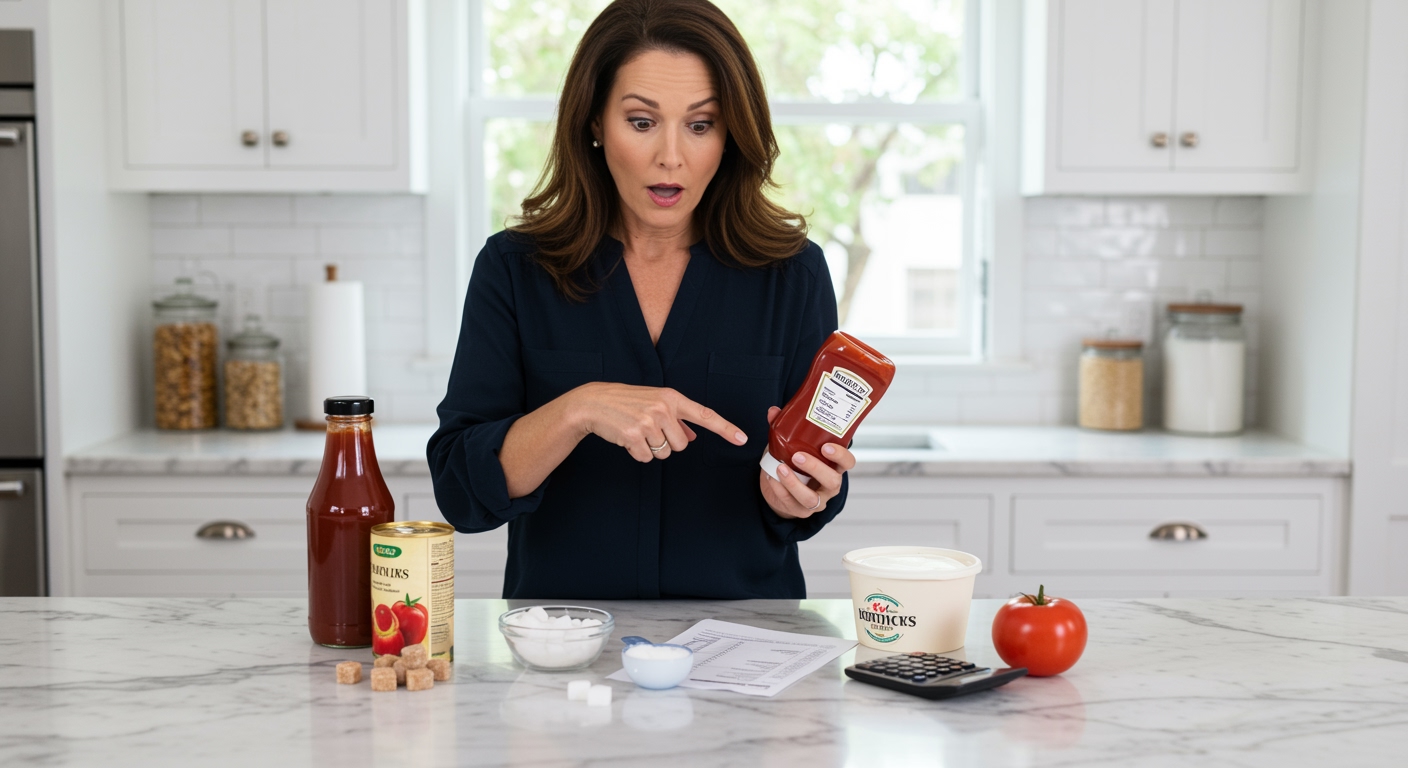✪ Key Takeaway: Popular ketchup brands contain 4 grams of sugar per tablespoon, exceeding the sugar content of many ice cream brands.
Introduction
You squeeze that familiar red bottle onto your fries without a second thought.
Most people consider ketchup a harmless vegetable-based condiment that adds flavor to meals. The reality behind this innocent-looking sauce will shock you when you discover what food manufacturers have been hiding in plain sight on nutrition labels.
Hi, I’m Abdur, your nutrition coach and today I’m going to expose the alarming sugar content in popular ketchup brands that exceeds what you find in frozen desserts.
How Much Sugar Does Ketchup Actually Contain?
The numbers will make your jaw drop when you examine ketchup nutrition labels closely.
A single tablespoon of regular ketchup contains approximately 4 grams of sugar. This measurement represents nearly one full teaspoon of pure sugar concentrated into that small serving size. Most people use far more than one tablespoon when they douse their food with this popular condiment.
The sugar concentration in ketchup reaches about 20-25% by weight. This means that one-quarter of every bottle consists of various forms of sugar including high fructose corn syrup, corn syrup, and regular sugar. Food manufacturers add these sweeteners to balance the natural acidity of tomatoes and create that addictive taste profile consumers crave.
When you compare this to other condiments, ketchup ranks among the highest sugar offenders. Mustard contains virtually no sugar while mayonnaise has less than 1 gram per tablespoon. Even barbecue sauce, another sweet condiment, typically contains 2-3 grams of sugar per serving.
The serving size listed on ketchup bottles creates another layer of deception. Manufacturers list nutrition facts for one tablespoon, but most people use 2-4 tablespoons per meal. This means your actual sugar intake from ketchup alone can reach 8-16 grams in a single sitting.
Restaurant portions amplify this problem significantly. Fast food chains and casual dining establishments often provide ketchup packets or squeeze bottles that encourage liberal use. A typical restaurant serving of fries with ketchup can deliver 20-30 grams of sugar before you even consider your main dish.
✪ Fact: Americans consume over 3 billion pounds of ketchup annually, translating to massive hidden sugar intake.
Does Ketchup Really Have More Sugar Than Ice Cream?
This comparison reveals the shocking truth about processed food marketing.
Premium vanilla ice cream contains approximately 14 grams of sugar per half-cup serving. When you calculate the sugar density per tablespoon, ice cream delivers about 3.5 grams of sugar. This means ketchup actually contains more sugar per tablespoon than many ice cream brands.
The concentration factor makes this comparison even more striking. Ice cream consists primarily of milk, cream, and air, which dilutes the sugar content throughout the volume. Ketchup, however, packs its sugar content into a much denser, concentrated form that delivers an immediate glucose spike to your bloodstream.
Your body processes these sugars differently based on the food matrix. Ice cream contains fat and protein that slow sugar absorption, creating a more gradual blood glucose response. Ketchup delivers its sugar load rapidly because it lacks significant amounts of fiber, fat, or protein to buffer the absorption.
The psychological aspect compounds this issue further. People perceive ice cream as a dessert treat and consume it occasionally with awareness of its sugar content. Ketchup masquerades as a vegetable-based condiment, leading to frequent, unconscious consumption throughout the day.
Food manufacturers exploit this perception by marketing ketchup as made from tomatoes, emphasizing the vegetable connection while downplaying the sugar content. The bright red color reinforces the tomato association, making consumers forget about the added sweeteners that dominate the ingredient list.
✪ Pro Tip: Read ingredient lists where items appear in order of quantity – sugar often ranks second or third in ketchup.
Why Do Manufacturers Add So Much Sugar To Ketchup?
The answer lies in food science and consumer psychology working together.
Tomatoes naturally contain acids that create a sharp, tangy flavor profile. Food manufacturers add sugar to balance this acidity and create a more palatable taste that appeals to mass market preferences. Without sufficient sugar, ketchup would taste overwhelmingly sour and acidic to most consumers.
The bliss point concept drives much of this formulation strategy. Food scientists have identified the precise combination of sugar, salt, and fat that triggers maximum pleasure responses in the human brain. Ketchup manufacturers engineer their products to hit this neurological sweet spot that keeps consumers coming back for more.
Sugar also serves important functional purposes beyond taste enhancement. It acts as a natural preservative that extends shelf life and prevents bacterial growth. The high sugar concentration creates an environment where harmful microorganisms cannot survive, reducing the need for artificial preservatives that consumers might find objectionable.
Manufacturing economics play a crucial role in these formulation decisions. Sugar costs significantly less than tomatoes or other quality ingredients. By increasing the sugar ratio, manufacturers can reduce overall production costs while maintaining the familiar taste profile that consumers expect from their products.
The addiction factor cannot be ignored in this equation. Sugar triggers dopamine release in the brain’s reward centers, creating mild addictive responses that encourage repeat purchases. Consumers develop preferences for specific brands based on their sugar content, even though they may not consciously recognize this chemical dependency.
Market research consistently shows that consumers prefer sweeter versions of savory condiments when given blind taste tests. This preference drives manufacturers to gradually increase sugar content over time, creating an escalating cycle where products become progressively sweeter to maintain competitive advantage.
✪ Note: High fructose corn syrup appears in most commercial ketchups because it costs less than regular sugar.
What Health Problems Does Hidden Ketchup Sugar Cause?
The health consequences extend far beyond simple calorie counting.
Regular ketchup consumption contributes to blood sugar spikes that stress your pancreas and promote insulin resistance over time. Each tablespoon delivers a concentrated glucose load that forces your body to produce insulin rapidly, creating metabolic strain that accumulates with repeated exposure.
The high fructose corn syrup commonly used in ketchup bypasses normal satiety mechanisms in your body. Unlike glucose, fructose does not trigger leptin release, the hormone that signals fullness to your brain. This means ketchup sugar can contribute to overeating patterns without providing any sense of satisfaction or fullness.
Dental health suffers significantly from frequent ketchup exposure. The combination of sugar and acid creates an ideal environment for tooth enamel erosion and cavity formation. Many people consume ketchup multiple times daily without considering its impact on their oral health, leading to accelerated dental decay.
Weight management becomes more challenging when hidden sugars like those in ketchup sabotage your efforts. A person who uses ketchup twice daily can unknowingly consume an extra 2,000-3,000 calories per year from this single condiment. This translates to approximately one pound of unwanted weight gain annually.
The inflammatory response triggered by high sugar intake affects multiple body systems. Chronic consumption of added sugars promotes systemic inflammation that contributes to heart disease, diabetes, and other metabolic disorders. Ketchup’s concentrated sugar content makes it a significant contributor to this inflammatory burden.
Children face particular risks from regular ketchup consumption because their taste preferences develop during early years. Kids who grow accustomed to high sugar levels in condiments often struggle to enjoy natural flavors in whole foods, creating lifelong preferences for processed, sweetened products that undermine their nutritional health.
✪ Fact: The average American consumes 71 pounds of added sugar annually, with condiments contributing significantly to this total.
How Can You Reduce Your Ketchup Sugar Intake?
Smart strategies can help you enjoy flavor without compromising your health goals.
Start by reading nutrition labels carefully and choosing reduced sugar or no-sugar-added ketchup varieties when available. These products use natural sweeteners or simply reduce the overall sugar content while maintaining acceptable taste profiles. Some brands offer organic versions with lower sugar content and higher quality ingredients.
Portion control provides immediate benefits without requiring complete elimination. Use measuring spoons initially to understand what one tablespoon actually looks like, then gradually reduce your serving sizes. Most people can cut their ketchup usage in half without significantly impacting their meal enjoyment.
Homemade ketchup offers complete control over sugar content and ingredient quality. You can make delicious versions using fresh tomatoes, vinegar, and minimal sweeteners like stevia or small amounts of honey. This approach eliminates high fructose corn syrup and artificial preservatives while reducing sugar by 50-75%.
Alternative condiments can satisfy your flavor cravings without the sugar overload. Mustard, hot sauce, salsa, and herb-based sauces provide bold flavors with minimal added sugars. Experiment with different options to find satisfying replacements that complement your favorite foods.
Gradual reduction works better than sudden elimination for long-term success. Mix regular ketchup with unsweetened tomato sauce in increasing ratios over several weeks. This approach allows your taste buds to adjust slowly while maintaining the familiar flavor profile you enjoy.
Focus on enhancing natural food flavors instead of masking them with sweet condiments. High-quality ingredients prepared with proper seasoning techniques often require less enhancement from sugary sauces. Invest time in learning basic cooking skills that bring out the inherent deliciousness in whole foods.
✪ Pro Tip: Mix ketchup with plain Greek yogurt to reduce sugar content while adding protein and probiotics.
The Bottom Line
Your favorite ketchup contains more sugar per tablespoon than many ice cream brands, making it a hidden saboteur in your daily nutrition.
The most dangerous foods are often those we never suspect because they masquerade as healthy choices while delivering concentrated doses of ingredients that undermine our wellbeing.
I encourage you to share your thoughts about this ketchup revelation in the comments below – have you checked your favorite brand’s sugar content, and what alternatives have you discovered that satisfy your taste preferences without the hidden sugar overload?
References
At NutritionCrown, we use quality and credible sources to ensure our content is accurate and trustworthy. Below are the sources referenced in creating this article:
- Healthline: Ketchup Nutrition Facts
- Business Insider: Sugar in Condiments Nutrition Facts
- Healthline: 18 Surprising Foods High in Sugar
- WebMD: Foods With More Sugar Than You Think





